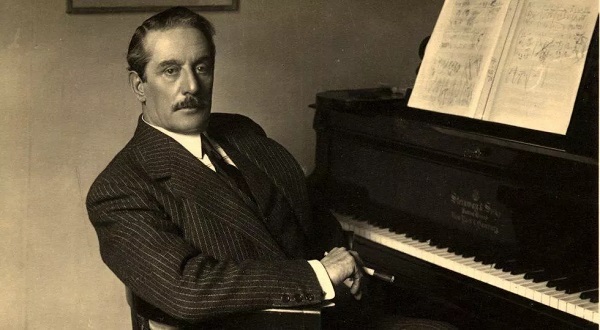Early Life and Education
Giacomo Antonio Domenico Michele Secondo Maria Puccini was born on December 22, 1858, in Lucca, Tuscany, Italy. He hailed from a musical lineage; his family had produced several notable composers and musicians over five generations. Puccini’s father, Michele Puccini, was a respected maestro di cappella and a composer, but his untimely death in 1864 left the family in financial hardship.
Raised by his mother, Albina Magi, young Giacomo’s early education was under the tutelage of his uncle, Fortunato Magi. Initially showing little promise, Puccini’s interest in music blossomed after attending a performance of Verdi’s “Aida” in Pisa. This experience solidified his ambition to become a composer.
In 1880, Puccini enrolled at the Milan Conservatory, where he studied under influential composers such as Amilcare Ponchielli and Antonio Bazzini. His time in Milan exposed him to the vibrant cultural scene and the possibilities of opera, which profoundly influenced his future career.
Early Career and Initial Successes
Puccini’s early works included “Preludio sinfonico” (1882) and “Capriccio sinfonico” (1883), the latter earning him some recognition. However, his true breakthrough came with the one-act opera “Le Villi” (1884). Though initially unsuccessful in a competition, it gained traction with the help of publisher Giulio Ricordi, who became a crucial supporter.
Following this, Puccini composed “Edgar” (1889), which was less well-received. Nevertheless, it marked his growing experience in opera composition. His perseverance and evolving style would soon lead to his first major triumph.
Major Works and Peak of Career
Puccini’s third opera, “Manon Lescaut” (1893), established him as a significant operatic composer. Based on the novel by Abbé Prévost, it was a departure from the prevailing verismo style, combining emotional depth with rich melodic invention. This work was a precursor to his greatest achievements.
The subsequent decade saw the creation of some of his most enduring operas. “La Bohème” (1896), based on Henri Murger’s “Scènes de la vie de bohème,” premiered to moderate success but grew in popularity and remains one of the most performed operas worldwide. This work exemplified Puccini’s talent for creating sympathetic characters and memorable melodies.
Following “La Bohème,” Puccini composed “Tosca” (1900), a dramatic tale of love, betrayal, and political intrigue set against the backdrop of Napoleonic Rome. Its powerful arias and gripping storyline solidified Puccini’s reputation for operatic drama.
“Madama Butterfly” (1904) initially faced criticism, but revisions led to its eventual success. This opera, blending Japanese and Western musical elements, is celebrated for its beautiful arias and tragic narrative, showcasing Puccini’s sensitivity to cultural nuance and human emotion.
Later Years and Final Works
Puccini’s later works continued to display his evolving style and mastery. “La fanciulla del West” (1910), set in the American Wild West, experimented with orchestral textures and broke new ground in its narrative and musical approach.
“The Triptych” (Il trittico), consisting of three one-act operas—”Il tabarro,” “Suor Angelica,” and “Gianni Schicchi”—premiered in 1918, demonstrating Puccini’s versatility. Each piece offered a distinct tone, from the dark drama of “Il tabarro” to the comic brilliance of “Gianni Schicchi,” the latter featuring the famous aria “O mio babbino caro.”
Puccini’s final opera, “Turandot,” remained unfinished at his death. Based on a Persian tale adapted by Carlo Gozzi, it explores themes of love and sacrifice. Puccini died on November 29, 1924, in Brussels, Belgium, leaving “Turandot” incomplete. Franco Alfano later finished the work, and it premiered in 1926.
Legacy and Influence
Giacomo Puccini’s operas are celebrated for their melodic richness, dramatic intensity, and intricate character portrayals. His ability to blend lyrical beauty with emotional depth has ensured his place among the great operatic composers.
His works continue to be performed worldwide, beloved for their timeless appeal and innovative integration of various musical and cultural elements. Puccini’s contribution to the operatic repertoire remains a testament to his genius, securing his legacy as one of the most influential figures in classical music.
Major Works
- Le Villi (1884)
- Edgar (1889)
- Manon Lescaut (1893)
- La Bohème (1896)
- Tosca (1900)
- Madama Butterfly (1904)
- La fanciulla del West (1910)
- La rondine (1917)
- Il trittico (1918)
- Il tabarro
- Suor Angelica
- Gianni Schicchi
- Turandot (unfinished, completed by Franco Alfano, 1926)
Conclusion
Puccini’s life was marked by a relentless pursuit of musical excellence, drawing from personal experiences and diverse influences to create operas that resonate with audiences to this day. His innovative approaches to operatic composition and ability to evoke profound emotional responses ensure his enduring popularity and critical acclaim.


Comments are closed